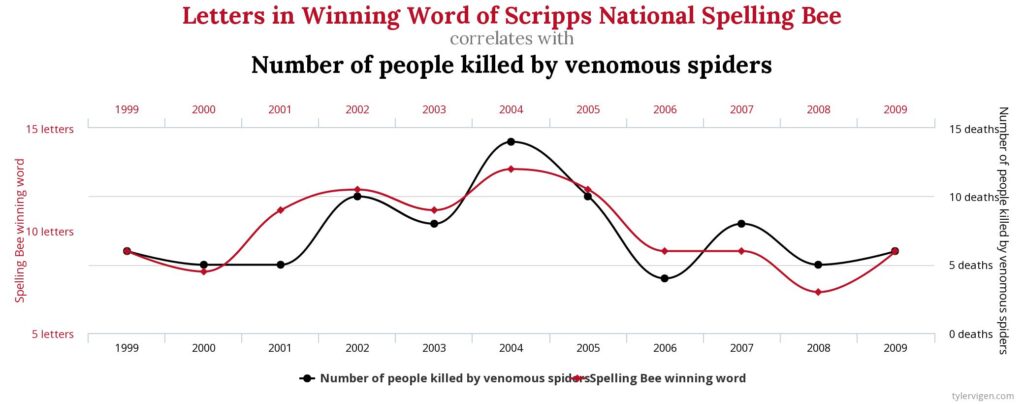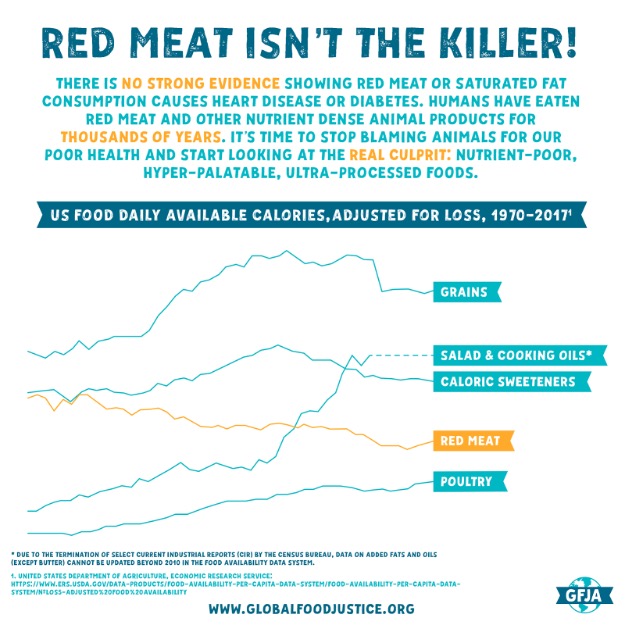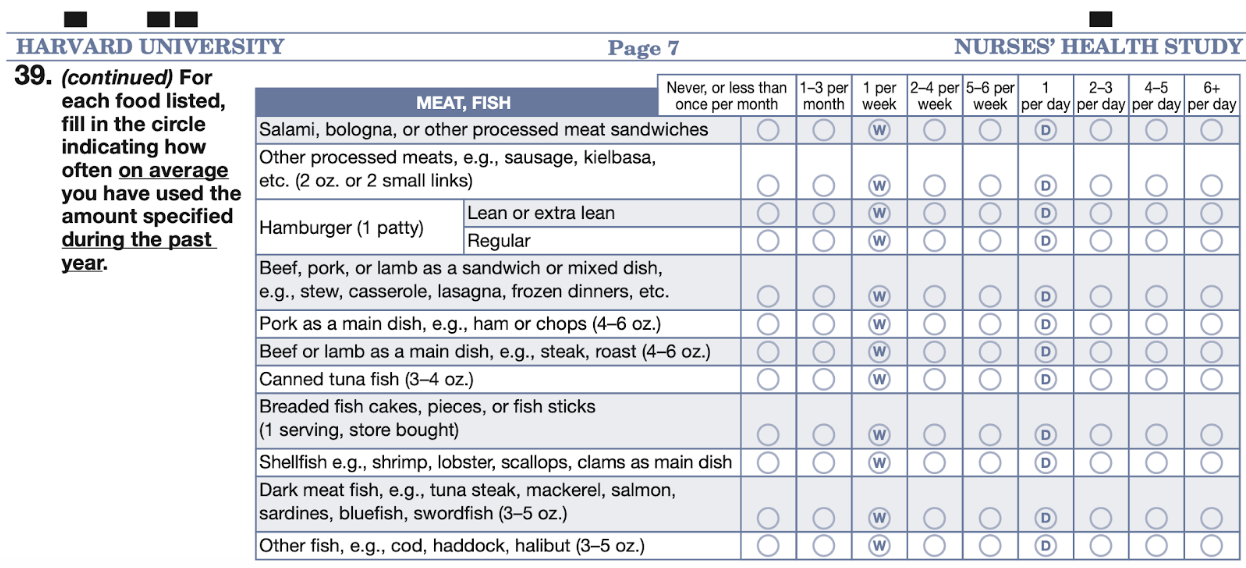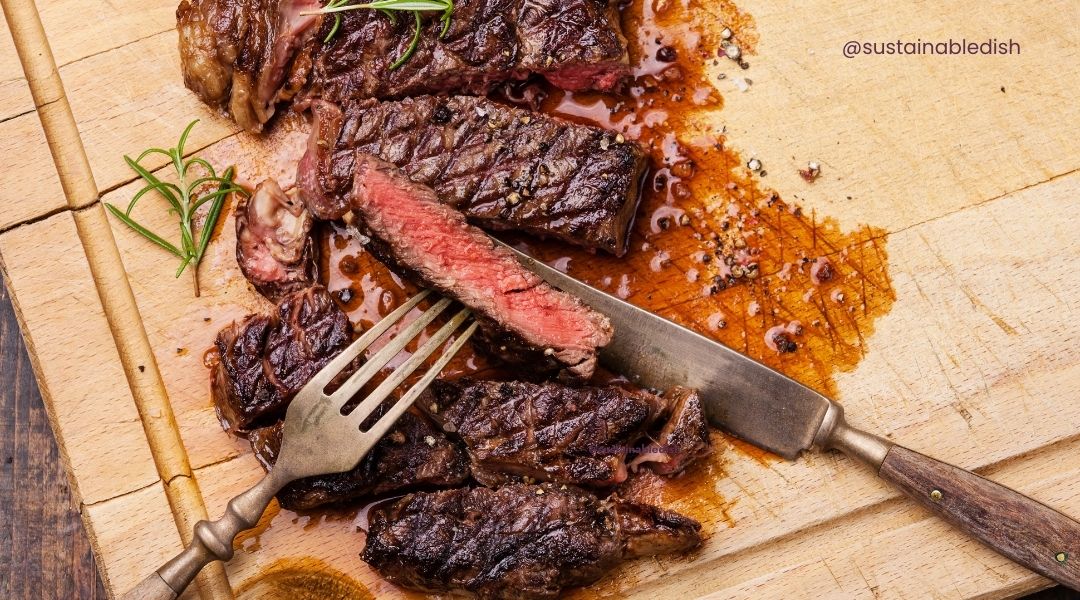You may have heard on the news about new “evidence” that eating red meat causes type 2 diabetes due to the latest study from Harvard School of Public Health. As a dietitian dedicated to uncovering the truth about the health and sustainability impacts of meat and livestock production, I’d like to share a few insights before you cut meat from your diet.
#1: Correlation doesn’t equal causation.
Although the media may use the word “cause” in this case, the study only shows a link. Red meat intake in the population they looked at was associated with an increase in type 2 diabetes, but this doesn’t mean that red meat caused the disease.
No mechanism was proven in this study. It wasn’t an experiment where they controlled the diet in two sets of people with the only change being one group ate steak. Instead, this observational study looked at disease outcomes and then looked at what these folks reported for their diet.
One fantastic example of two things that are associated with each other but don’t cause each other is illustrated below. This compares the letters in the winning word of a winners national spelling bee to the number of people killed by venomous spiders. These two are clearly a great correlation, but logic tells you that of course one doesn’t cause the other. More fun examples can be found at Spurious Correlations.

People who have type 2 diabetes may eat more meat, but they are also more likely to drink alcohol, smoke, exercise less, and eat a less healthy diet overall. It’s impossible to take one aspect of diet in an observational study and claim that that one food is the driver of disease.
No mechanism has ever been proven to show red meat causes disease. People have been eating red meat for about 3.5 million years, and in fact, our red meat intake per capita has decreased since 1970.
Today in the US, 60% of calories are consumed in the form of ultra processed foods. So if red meat is responsible for an increase in type 2 diabetes, wouldn’t we see an increase in red meat intake as we’ve seen the rates of type 2 diabetes increase?

John Ioannidis of Stanford University asserts that observational research regarding nutrition is more likely to be false than true. This is primarily due to the bias of the person analyzing the data. When tested in clinical trials, observational research has only been found to be correct 0 – 20% of the time, meaning 80 – 100% of the time it’s wrong. And as I’ll explain in point 3, there are numerous conflicts of interest and intellectual bias when it comes to the lead author Walter Willett.
#2: Food frequency questionnaires are unreliable.
Numerous studies have shown that food frequency questionnaires are an unreliable way to collect information on what people eat.
Below is a screenshot of the actual questionnaire used in the Nurses’ Health Study.

You can see that in the meat category, “hamburger” is considered meat. Does this include just the patty, or is this a fast-food burger, often eaten with fries and a large soda with a deep fried apple pie for dessert?
Lasagna, frozen meals, and stews are also “meat”. Is this a convenience store canned stew, or a homemade stew made from fresh veggies and meat? How much meat does lasagna really have in it? Your average sandwich is a ton of bread, smothered in mayo, with only about 2oz of meat on it. Do you remember how often you ate lasagna, burgers, or sandwiches that might contain some meat? Most people do not.
Additionally, it’s also been shown in multiple studies that people lie about their lifestyles. They’re much more likely to say they workout, less likely to report smoking and drinking, and they overall inflate what they think will make them look better on these questionnaires.
#3: Walter Willett’s undeclared conflicts of interest.
Conflicts of interest (COI) don’t necessarily mean a study is garbage. Government and universities can’t pay for all of the research to be done, so of course industry does fund a large number of nutrition studies that wouldn’t happen unless they paid for it. Again, this doesn’t mean that the folks doing the research funded by industry are corrupt, however it’s completely unethical not to declare a COI.
I personally wrote a book promoting the benefits of eating meat and partner with food and skincare companies to support the work I do on social media. I’m also an omnivore. I don’t hide any of this. My non-profit it not industry funded.
As an ethical scientist, I’m going to do my best to present the information I see in a fair way. I see benefits to eating plant-based foods as well, and I will not make a claim that I can’t stand behind. However, Walter Willett needs to also disclose his COIs and bias, and he does not.
Here’s just some of the COIs that the Nutrition Coalition published here in 2019:
Ideological conflicts of interest:
- Willett is the author of three diet books, all of which advocate against the regular consumption of red meat.
- Willett has published 130 papers concluding that a vegetarian or mostly-vegetarian diet is optimal for health.
- Willett has been quoted as saying “the optimum amount of red meat you can eat should be zero”. (2001)
Financial conflicts of interest:
- The Peanut Institute has donated between $250,000 and $499,999 to the Harvard School of Public Health. The Walnut industry donated between $100,000 and $249,999 to the Harvard School of Public Health. Since this time, Willett has published at least two studies that promote the use of walnuts and peanuts without declaring any conflicts of interest.
- Nature’s Touch Frozen Foods, a company that sells exclusively frozen fruits and vegetables, donated between $1,000 and $99,000 to the Harvard School of Public Health.
- Nutrient Foods, a company that sells vegetarian foods like shakes, bran shakes, cereal, oatmeal and rice cereal donated between $1,000 and $99,000 to the Harvard School of Public Health.
COI due to Organizational Affiliations:
- Willett is an advisor to the Blue Zones company, which advocates for and sells plant-based diet programs.
- Willett is a scientific advisor to Menus of Change, a group promoting “plant forward” diets and states that meat should be served as a condiment.
- Willett is on the board of the True Health Initiative, directed by vegan David Katz, which advocates against the consumption of red meat.
- Willett is on the board of the American College of Lifestyle Medicine, which advocates against the consumption of red meat.
This is just a handful of the full list published by Nutrition Coalition, which can be found, along with citations, here.
#4: Use your common sense.
When the media is spreading a new study, listen carefully to the words they’re using. Know if the study shows a “link” or “association” or if there’s an actual cause. See if you can read the study yourself and look for the type of study it was. Did they use food frequency questionnaires, or was it an experiment? Just because a study comes from a prestigious school, that doesn’t mean we should blindly trust it.
Red meat is an easy scapegoat right now. It’s being blamed for everything from cancer, heart disease and now type 2 diabetes, to climate change. Of course, many people also have ethical reasons why they feel it’s wrong to eat beautiful animals, especially cows because they look so much like pets.
It’s far more likely that high calorie ultra-processed foods, which are “hyper-palatable” and stimulate us to overeat, yet are nutritionally poor, are the drivers of lifestyle related diseases like type 2 diabetes. In fact, a ketogenic diet (that includes red meat) was proven to reverse type 2 diabetes in a randomized controlled study.
And when it comes to climate change, the truth is that the emissions from cattle are a very small drop in the bucket compared to fossil fuels, but this narrative is being pushed by those who profit off of the fear of red meat, like the alt-meat companies and big oil companies.
Robb Wolf and I cover these topics in our book, Sacred Cow. I also directed and produced the film, Sacred Cow, which includes expert interviews with nutrition experts, doctors, scientists and regenerative ranchers who are using cattle to improve ecosystem health.
And if you’re looking to learn more about how your personal diet can be the most nutritious and sustainable in a course format, check out Sustainavore.
Finally, if you agree that red meat belongs on the table and want to help my mission of ensuring all people have access to meat, consider joining the Global Food Justice Alliance. Thank you.









5 thoughts on “Four Reasons Why Red Meat Doesn’t Cause Type 2 Diabetes”
When I heard about this study while listening to NPR, I immediately listened closely and noticed that it declared no causation and that there was no consideration of the other lifestyle habits of the people who completed the questionnaire. And of course, questionnaires are notoriously unreliable.
I have been eating a generally ketogenic for the past 13 years and it completely eased all food cravings and enables me to stay at a healthy weight into my 60’s without any effort.
Thank you for all of the good work you are doing.
Thank you so much for your brave writings and honest delve into this subject. I have always been a proponent, and stress to my grandchildren to know the source, read both sides and then make your decisions. Please keep up the great work!
Dianna you are making a remarkable effort to bring the truth out to the world. It is obvious that we need red meat in our diet especially for children and the elderly people not only to remain well but alert and sharp leading to a full quality life, regardless of age. Thank you Dianna and your partners for bringing wisdom to more and more people who are gratefully responding. Mary Duggan
I think the big question here, is who is pushing/funding this anti-meat agenda? This story is all over the place and getting so much coverage – whose agenda is this?
Very clear explanation for why this study needs to be taken with a grain of salt. Thank you for this.